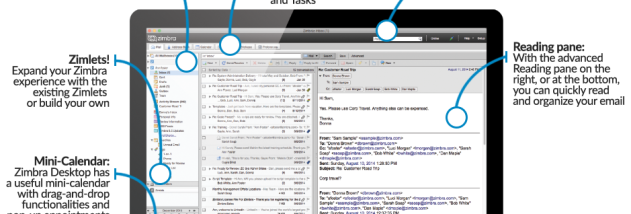
- #Zimbra desktop a client error occured how to
- #Zimbra desktop a client error occured install
- #Zimbra desktop a client error occured password
#Zimbra desktop a client error occured how to
But cannot find how to count wrong logins for particular account via web UI. What I want to achieve, is pick logs, and find IP addresses and account names, that get false authentication - penetration, brute force, etc. There should be something, or how does Zimbra count unsuccessfull logins, including web ui, to introduce automatic lockout? Or, I can identify IP address (if URI filtering could be reliable), that missed web ui login, but cannot relate it to particular account.Īt this point I'm stuck. Contacts?.), but this at particular timestamp, may be related to any other sessions, that at single point of time might have success in auth. No related info in audit.log nor mailbox.log according to session ID.: The difference between failed and success POST event (further only static resources loaded, added sessinon ID, but I cannot find, if there's any use of session ID. But no user account at this point available, as well, as I cannot warranty, that tailing URIs are the right way to watch logs. The only way to find out, that somebody is trying to guess web ui pass, or trying to penetrate login form, is to follow POST requests in Nginx (Zimbra Proxy) log files, which do give sign of difference. No auth errors in mailbox.log, nor audit.log files.
#Zimbra desktop a client error occured password
Now, what I was looking for - there are no signs of wrong web ui password entry. This helps a little, as we can distinguish oip, but not very much, if users are logging on via NATted network and single gateway IP.

Yet, there's no option to tie together Nginx and mailbox.log data to a single account, as during a second, there may be several authentications to different accounts. But that's in case, we have rare authentication events. Yet, in Nginx log, there's a POST event, corresponding to event in mailbox.log, during /service/soap/AuthRequest. Regarding AuthRequests - I cannot find information, what's the last element in log entry - 'elapsed=X', where X is numbers.Īnd the opposite - during logout, there's a notice about /service/soap/EndSessionRequest.īy this, I may catch the fact, that user has successfully authenticated, and due to activity in mailbox.log and proxy server /nginx.log timestamps gather activity, that some resources get downloaded (img, css, js, etc.). Assuming this, such log entry can be used just to track, that user has successfully logged in and from which IP address, User agent, etc. Amongst them - there are /service/soap/AuthRequest requests, indicating external oip and user name. When auth is successfull, there's a bunch log entries to /service/soab/GetInfoRequest. Log in to your server and as the zimbra user edit /opt/zimbra/conf/ and change the $max_servers config line.Thank you Rich, for hint. However,you may find that each process is now using more RAM so overall usage hasn't decreased. Reducing the number of process may reduce the amount of RAM used by AV scanning may allow other components of the system to use more RAM, effectively improving the responsiveness of the server, at the expense of reducing the speed of email delivery. If your server isn't expected to under much load and/or you're not too worried about mail queueing waiting to be scanned you can reduce the number of instances of amavisd that get spawned. Īnti-virus spawns a number of threads so that it can concurrently process incoming and outgoing email. */15 * * * * /opt/zimbra/libexec/zmlogprocess. Will cause a bigger CPU spike on the hour.Ġ0,10,20,30,40,50 * * * * /opt/zimbra/libexec/zmlogprocess. Reduce status logging to hourly (from every 2 mins) */60 * * * * /opt/zimbra/libexec/zmstatuslog

*/2 * * * * /opt/zimbra/libexec/zmstatuslog To check services enabled zmprov gs | grep zimbraServiceEnabledĪdditionally its common to tune down the frequency of scheduled tasks (edit config file with crontab -e, some lines in table below truncated with. Toggles/disables the logger service - I don't do this myself, seems too drastic
#Zimbra desktop a client error occured install
Working Ubuntu LTS Server installation - see Ubuntu Installation for further install info together with (will redirect you to a trail registration page that you need to complete 1st, have never been contacted by them).


 0 kommentar(er)
0 kommentar(er)
